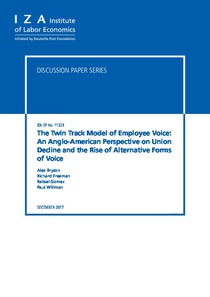The twin track model of employee voice: an Anglo-American perspective on union decline and the rise of alternative forms of voice
"We present a simple framework for analyzing decline in union voice in the Anglo-American world and its replacement by non-union, often direct, forms of worker voice. We argue that it is a decline in the in-flow to unionisation among employers and workers, rather than an increase in the outflow...
| Main Authors: | , , , |
|---|---|
| Institution: | ETUI-European Trade Union Institute |
| Format: | TEXT |
| Language: | English |
| Published: |
Bonn
2017
IZA |
| Subjects: | |
| Online Access: | https://www.labourline.org/KENTIKA-19395631124911138139-The-twin-track-model-of-employ.htm |
| Summary: | "We present a simple framework for analyzing decline in union voice in the Anglo-American world and its replacement by non-union, often direct, forms of worker voice. We argue that it is a decline in the in-flow to unionisation among employers and workers, rather than an increase in the outflow rate, that accounts for this decline. We show how union decline is predicted by experience good and cost-disease models of trade unionism and is linked to specific institutional and policy constraints on union organizing in the Anglo-American world. We show how the coexistence of union and non-union forms of worker voice is predicted by transaction cost economics, while the growth in non-union forms of worker voice is aided by declining costs of employers "making" voice mechanisms. We draw on "spurt" theories of unionisation to help understand factors underpinning union decline, including falling costs of employer opposition to unionisation as density falls, as discuss possibilities for "bottom-up" growth in union-like forms of worker voice implied by "spurt" theories." |
|---|---|
| Physical Description: | 65 p. Digital |

